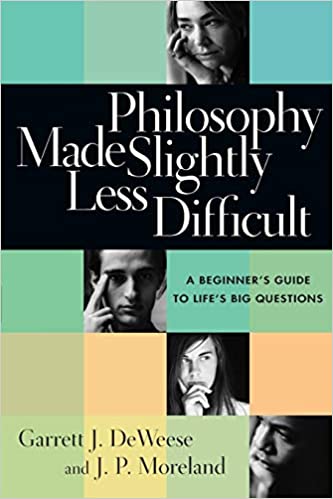A Book Review from Books At a Glance
By Steve West
About the Authors
Garrett DeWeese and J. P. Moreland teach at BIOLA University and the Talbot School of Theology. They are the authors of numerous books and articles.
Table of Contents
Chapter 1 Where Do I Start?
Chapter 2 What is Real?
Chapter 3 How Do I Know?
Chapter 4 How Should I Live?
Chapter 5 What Am I?
Chapter 6 How Should Christians Think About Science?
Chapter 7 Where Do I Go From Here?
Review
In his magisterial work on the history of philosophy, Anthony Kenny remarks: “But, however hard one tries, it is impossible to make the reading of philosophy an undemanding task. As has often been said, philosophy has no shallow end.” As students and educators—and everyone else who is interested in philosophy—have discovered, Kenny’s statement is perfectly true. In fact, one of the discouraging things about progressing into more technical literature in philosophy is finding out that philosophers are often claiming that other professional philosophers have misunderstood their arguments and positions.
When it comes to the history of philosophy, there are also all kinds of debates about how to interpret aspects of Plato, Anselm, Kant, or Nietzsche (as well as many, many others). Simply put, philosophy is a hard subject, and the difficulty of the subject matter isn’t helped by the obscure and often dense language of the philosophers. Yet even when philosophers write clearly, the content can be hard to understand.
Different books on philosophy arrange the core subject matter in different configurations. For example, some may want to begin with epistemology and then move to metaphysics. DeWeese and Moreland discuss metaphysics before epistemology. In many ways this is a matter of preference: there is no one right way to order the progression of material. As those who study philosophy and worldviews know, the issues interpenetrate. We cannot know how we know without knowing something about how our minds work and what the world is like. The nature of reality impinges on epistemology, and conversely, epistemic issues cannot be sidestepped when it comes to how we learn about metaphysics. Both subjects converge and affect each other.
For beginners, the material in this book is comprehensible but requires attention and thought. The authors introduce a lot of positions and set forth the main arguments for and against them. They are even-handed in their presentation, but do not merely float out the options—they make their own point of view clear. Readers who really are new to philosophy will likely have to take their time; there are a lot of different positions surveyed in this short book, and all the different positions introduce new terms and concepts. Getting the vocabulary, terms, and technical jargon is essential for following even basic philosophical discussions, and the reader will have to learn, not merely read, to benefit from this book. It is, after all—as the title suggests—philosophy made slightly less difficult.
The topics covered are standard for an overview of philosophy. Metaphysics, Epistemology, and Ethics tend to be viewed as the major blocks of philosophy, and this book covers them in what is arguably its three main chapters. The next two chapters seem more particularly written with Christian concerns in mind. The first of these two chapters is dedicated to a philosophical and theological anthropology (obviously most secular introductions to philosophy do not provide any special interest in theological views of anthropology). The second chapter deals with the nature of science, and the interaction of science with the Christian faith. Again, this is not how secular philosophers approach science. (The chapter about science is entitled: “How Should Christians Think About Science? Philosophy of Science.” There’s not much doubt about the intentionality of their approach to the subject from a Christian perspective!)
Although not every Christian philosopher will agree with every argument put forth in the book about anthropology and science, Moreland’s writings on Christianity and the philosophy of science, as well as the relationship between the mind/soul and the brain (advocating substance-dualism) are widely read amongst evangelical philosophers. Substance-dualism is certainly out of vogue in secular philosophy, but Moreland mounts as credible a philosophical defense of it as can be found in evangelical circles. The position taken on free will and theological determinism is libertarian free will rather than a Calvinistic compatibilism. It is likely that the theological commitments of the reader will determine how persuasive they find the book’s discussion of these points.
Overall, this book lands solidly in the center of philosophy done from a broadly conservative evangelical perspective. Readers need not agree with every position taken to gain largescale benefits from the work. It is probably most beneficial for students. Pastors who have young people in their churches who attend university could also find this a helpful resource. To really understand the issues and topics deeper study would be required, but as a starting place, or for someone who needs to learn the basics so they can at least follow or contribute to a philosophically geared conversation, this is a very helpful—and concise—publication. Philosophy has no shallow end, but in this book, the reader is not thrown into the deep end. It’s a good place to enter the water.
Steve West is Pastor of Madoc Baptist Church in Madoc, Ontario. He is also an adjunct professor at Toronto Baptist Seminary and an assistant editor with us here at Books At a Glance.

